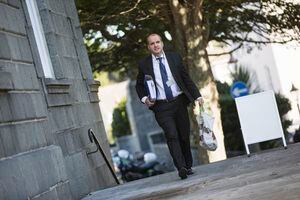‘We risk being seen as States which did nothing’
THIS government will go down in history for failing to achieve any meaningful change unless it cracks on and starts doing so now, deputies warned yesterday.

General debate on the 2019 Budget saw several States members express frustration about the lack of capital investment and transformation.
Scrutiny Management president Chris Green said the proposed review of the States’ 23 policy priorities, and whether enough resources were available to progress them, was not happening soon enough.
‘It will not be until June 2019. This Assembly will be leaving it very late indeed to hone those priorities,’ he said, adding that the States had limited time to put that right.
‘[If not] we will go down in history as a States that failed to achieve any meaningful change,’ he said. ‘The time is now for action.
‘I have had enough of the rhetoric and I would like to see some action.’
He said in many ways the Budget debate had been misused by some and used as a ‘vehicle for massive policy initiatives’, including significant civil service reforms.
‘These sorts of development should be allocated to a dedicated separate policy letter,’ he said.
‘It has somewhat cast a shadow over the Budget process.’
He said ‘radical departures in policy’ needed to be considered separately if proper scrutiny is to be applied.
Deputy Matt Fallaize said more needed to be done in future for people who were not particularly well off, but were not in a situation to take advantage of the increase in investments going into social welfare.
‘I think future Budgets need to give more consideration to the living expenses and tax burdens of these people,’ he said.
Referencing Deputy Green’s comments, the Education president said his committee’s multimillion-pound project to extend Les Beaucamps and St Sampson’s ‘will certainly be the single biggest capital programme that is immediately on the horizon’.
The number of amendments – 42 – that were laid to the original Budget also generated much debate.
‘The number of amendments are symptomatic of trying to push the Budget into the medium term financial plan,’ said Deputy Sarah Hansmann Rouxel.
She likened this to taking acorns from a tree which was getting older, without planting and nurturing new ones.
‘I don’t think we’re spending enough on those transformations to get where we need to be,’ she said.
Deputy Richard Graham said the States was sending out a bad message to businesses.
‘What will the business community think when they look at the 23 amendments? [laid by members not on Policy & Resources].
‘Not one of them was about the economy and we have to be careful about the message we are giving.’
Deputy Jan Kuttelwascher said the number of amendments demonstrated a ‘meltdown’ of the Budget process, while Economic Development president Charles Parkinson hoped the four days of debate on these propositions did not set a precedent.
Comment Page 10





